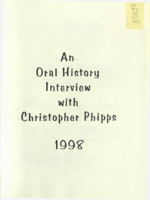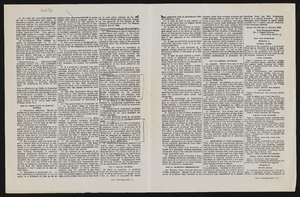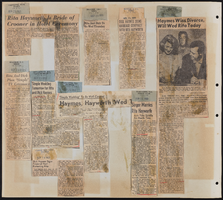Search the Special Collections and Archives Portal
Search Results

Transcript of interview with Christopher Phipps by Dennis McBride, November 6, 1998
Date
Archival Collection
Description
Christopher Phipps, attorney in Las Vegas discusses his life. Hailing from Honolulu, Hawaii, and his adventure that led him to Las Vegas, Nevada.
Text

Transcript of interview with Rachel Gibson by Kay Long & Caryll Batt Dziedziak, August 25, 1998
Date
Archival Collection
Description
Rachel Gibson was the granddaughter of Nevada pioneers. Her maternal grandparents, George Rammelkamp and Anna Dougherty, were among the earliest white residents of northern Nevada, settling first in Dayton and later Yerington. Her mother, Clara Angelina, and her two aunts, Elizabeth and Georgie, graduated from the University of Nevada at the turn of the century. Clara taught in Yerington for a number of years before marrying Chase Masterson, a dentist. Rachel was born in 1913 in Yerington. The eldest of three children, she continued the tradition of women’s learning and education that began with her mother’s generation. Her 1930 class was the first to graduate from Las Vegas High School, and soon after Rachel moved to California to attend college. Although her father had counseled her to study law, Rachel chose the field of economics. She received her Bachelor’s degree from the University of California at Berkeley, and worked in San Francisco for one year before returning to complete
Text

Transcript of interview with Brian Cram by Stefani Evans and Claytee White, October 28, 2016
Date
Archival Collection
Description
Throughout his career, former Clark County School District Superintendent (1989–2000) Brian Cram took his father's words to heart. He heard them repeatedly over the years as he watched and later, helped, his father clean classrooms at Robert E. Lake Elementary School: this place—the classroom—this is the most important place. Cram was born in Caliente, where his father worked on the railroad. In 1939, when Cram was a toddler, the family moved to Las Vegas and his father found work first as a sanitation engineer at a hospital, and then at CCSD as a custodian. The elder Cram, who spent his formative years in the Great Depression, prided himself on doing "good, honorable work" as a custodian, because the work—the classroom—mattered. Even so, he wanted more for his son. Cram largely ignored his father's advice during his four years at Las Vegas High School, where he ran with The Trimmers car club, wore a duck tail and a leather jacket, and copped an attitude. Cram's swagger, though, d
Text

Ricardo Torres-Cortez interview, May 7, 2019: transcript
Date
Archival Collection
Description
Interviewed by Barbara Tabach. Monserrath Hernández and Maribel Estrada Calderón also participate in the questioning. Born in Mexico, came to live in Las Vegas in 1985. Graduate of UNLV in Journalism and a reporter of Public Safety for the Las Vegas Sun. Ricardo covered the 1 October shooting, the killing of two police officers and other traumatic news of the community.
Text

Patricia Lappin interview, February 26, 1980: transcript
Date
Archival Collection
Description
From the Ralph Roske Oral History Project on Early Las Vegas collection OH-01063. On February 26, 1980, Nancy Bright interviewed school teacher, Patricia Lappin (born April 14th, 1924 in Denver, Colorado) at Robert L. Taylor Elementary School in Henderson, Nevada. The interview covers Boulder City, Nevada around Hoover Dam. The two discuss the different gambling habits between Southern Nevada locals and Las Vegas tourists. During the latter half of the interview, the two speak at length about the impact of nuclear waste on Nevada. Lappin explains the unique issues that Southern Nevada faces as one of three states to accept nuclear waste.
Text

Transcript of interview with Betty and Gus Ciliax by Connie Boich, March 2, 1977
Date
Archival Collection
Description
On March 2, 1977, collector Connie Boich interviewed Betty (born March 31, 1919 in Bisbee, Arizona) and Gus Ciliax (born May 13, 1909 in Michigan) in the Ciliax home in Las Vegas, Nevada. This interview covers Southern Nevada and early development of the area. During the interview, they also discussed local recreation, prostitution, Block 16, and various social activities, in addition to local businesses, such as Six Companies, the economy, Boulder Dam, and education in Nevada.
Text




